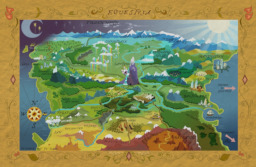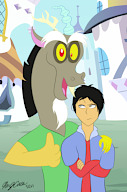
Dragons
The dragons of the southern badlands are the elementals of fire and flesh. Ferocious, savage and powerful, they are often looked upon with both terror and awe. Like the old griffons, they have built a society around warfare and strength, however to a degree that even the most feral of griffons could never hope to achieve.
Dragons are fire in body and spirit; their forms seem to oblige their feelings more than the laws of reality. There are no children in their culture: after every mating season, the pregnant females travel north in what has come to be known as the Great Dragon Migration. They lay their eggs which then hatch within the hour; the newborn hatchlings crawl towards their mother’s hoard of gemstones and start to claim parts of it as their own. The strong and greedy will grow swiftly, reaching adulthood within a few months – the weak and the kind will be pushed aside and eventually starve. Dragon mothers consider this a necessary and natural process and will not help their offspring should they suffer such a fate.
In contrary to almost every other sentient species, dragons possess no sense of morals. The very concept of something being ‘wrong’ is alien to them. Still they are more than just mindless animals, no matter how many times they have been called such: instead of ethics, each and every dragon is hatched with an instinctual understanding of pride and nobility that is fully developed during their late adolescence. Honour is the only thing more important to them than strength, and it is not earned just by defeating an enemy. At some point in their lives, every dragon will eventually settle their personal concept of honour into a clear list of rules, their Dragon Code. These Codes are usually a mixture of the two defining traits of dragon culture – ferocity and nobility – and will often include statements such as ‘Challenge every worthy opponent!’ as much as ‘Protect and care for the weak!’.
The Codes are a perfect example of the rampant individualism present in their culture. Every dragon is expected to reign over their own life, down to their personal code of honour. This does not mean that there is no social structure in their society however, quite the contrary is the case. Submitting to a stronger dragon can be a socially accepted act when it is done of one’s own accord. That way, particularly fearsome members of the species may come to lead entire armies of soldiers that serve them willingly. Similar factions are often founded by patriarchs of great dynasties, which leads us to the next point of interest.
Dragon culture is the only patriarchal society in the entire known world. The males happen to be stronger than the females, which in the eyes of their species equals greater worth. But besides strength and honour, there is a third authority they respect: family, in a very uncommon way. Like every higher race, dragons possess a natural magic, their fire. The magical components of a dragon’s inner flame vary greatly. Some show magical effects like a unicorn spell, others simply burn what they touch like common fire. However, it is important to understand that dragons hold this flame inside of them at all times – it is a part of what they are, not only when they choose to enchant their breath with it.
Dragons believe that their flames and their souls are one and the same thing. Each of them possesses such a flame, but their brightness and intensity varies greatly. The greatest of heroes with the brightest of flames will often choose champions amongst their followers in life. On their deathbed, they will summon their champion and breathe their flame into him, granting him the magic that ran through them before. Dragons believe that this way the younger one will gain the strength and courage of the older, who then will live on inside of him in turn. This is the only concept of family that dragons know: father and son, bound by flame instead of blood. Many dynasties have been formed this way, generations of dragons passing on the flames of heroes for countless of years.
As mentioned, it is usually these heroes with their ancestral flames that lead the other dragons into battle. Since they are as proud and noble as they are fierce, they have developed a surprisingly cultivated, well-structured approach to warfare, with leaders, second-in-commands, battalions and banners. Dragons, when assembling into an army, are the most disciplined soldiers known to the world; they can switch from a mad assault to a perfect lockstep and back in a second. They gather beneath the banner of their leader, usually a piece of cloth that bears the names of all those who carried his flame before him. At the beginning of every battle, particularly prideful leaders will use their breath to set their banners ablaze: they vow not only to defeat the enemy, but to do so before the name of their dynasty has been purged from the cloth. Winning such a bold gamble is a great honour – failing a horrible shame.
Dragons, especially their heroes, are constantly looking for a chance to prove their strength. War does not require a reason to them – as a result, the sociology of the southern badlands is in a constant state of strife. Armies form, disband, merge, break apart, assault each other, forge an alliance or break one and so on. Luckily, dragons do not only limit their fighting to each other most of the time, but also reproduce rather quickly – they would long be extinct if they didn’t.
It is a common misconception among the Equestrian populace to assume that because all dragons live for battle one way or the other, they are all warriors. While their culture leaves no room for anything not related to proving one’s strength, there are many ways to do so. Dragons practice what they call the ‘lethal arts’: smithery, tactics, philosophy of warfare and so on. Two thirds of the known martial arts, both armed and unarmed, hail from the southern badlands. Modern dragon leaders are among the most brilliant strategists there are, with thousands of great predecessors to learn from. Their weaponsmiths forge their own kind of sword, slim, light and with a single edge that can cut through solid steel with ease; dragon-forged weapons are without equal in both effectiveness and beauty with their gleaming, curved blades and hilts inlaid with gemstones. Armourers have developed a way to craft their own scales into overlapping designs that can ward off even those swords however – they refrain from using steel, as a dragon’s flame would simply melt that. These armour sets are of equally ornate designs and usually crowned by helmets that hide their bearer’s face behind a fearsome mask.
With so many subspecies of dragons present in the badlands, their cultural (and thus military) diversion has always come naturally. The sight of all of them moving at once has been described as awe-inspiring: dozens of colossal, winged reptiles diving through the sky with archers riding on their backs, hundreds of their smaller kin marching in perfect cadence beneath, their armour glittering in the light, their burning banners flying high. Tiny drakes scurrying in between their feet, slow but mighty earth dragons rising from their ranks like walking, gemstone-encrusted mountains. As much as an Equestrian might be amazed by their sight, as much are they disgusted by his. The dragons have always looked down on their northern neighbours, feeling contempt for their weak and soft little bodies.
The author is aware that the last sentence may seem strange to the uneducated Equestrian: if these dragons despise them so much, why have they never assaulted them? The answer is simple: they have. Dragon raids were an almost day-to-day occurrence in the early days. The last – and greatest – assault on southern Equestria is said to have occurred seventeen centuries ago. A host larger than anything the world had seen in a long time invaded Equestria by night; led by the young hero Guzzle they were intending to make an example of the lands to the north, to show the world the price of weakness. Guzzle had defeated nearly a dozen smaller hosts beforehand and incorporated the survivors into his own – even though he bore no ancestral flame, everyone in the badlands recognized him as one of the strongest and fiercest leaders of their race. He led an army consisting of thousands of warriors and rode the winged dragon Rend, his own brother, into battle. The alicorn siblings awaited them at the southern border of Equestria, alone.
To this day, dragons will not speak of what happened. The alicorns returned to Canterlot the next morning, allegedly in a very grim mood. Over the course of a few years after that, several sources indicate that hundreds of dragon banners had been lost to them in a single night, a catastrophic blow to the ancestry of their race. Afterwards, no dragon would speak the name Guzzle again – and no other army would ever set foot on Equestrian ground.










*claps*
Well, this was a very entertaining read. Your world building is great, the flow seamless and the have emotional impact. I especially the liked the parts about the Night Guard.
There is just one minor detail that irks me. Clearly Earth Walkerss are defined by their stronger bodies, Pegasi are defined by their wings but what defines Unicorns? Except their magic of course. Horns? A mark on the forehead/back of their hands? Having a magicaly adept human spezies called Unicorns, well, that just don´t sits right with me.
5318679 Elven ears, with bony protrusions turning them hard and sharp like horns. I still use regular elven ears for my LARP character, but I'm working on those.
And thank you, of course, for your compliments. I see that as ever, German writing attracts German readers.
5319335
Interessting idea. The fact that you LARP as a Night Guard too.
And what do you mean? You are a german writer?
5319369 Yup. Which is the issue, as most German writers I cannot write English - I can write German in English. Style and lingual flow remain German, which would be why it feels as natural to you and as awkward to a native speaker.
5319920
It´s not an "issue", it is "literary spice".^^